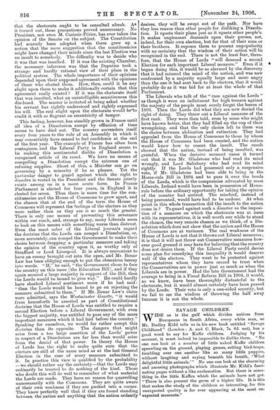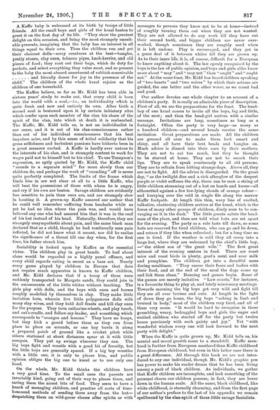SAVAGE CHILDREN.
WIDE as is the gulf which divides natives from Europeans in South Africa, every white man, so Mr. Dudley Kidd tells us in his new book entitled "Savage Childhood" (London; A. and C. Black, 7s. 6d. net), has a good word to say for Kaffir children. Judging by his account, it must indeed be impossible to dislike them. "No one can look at a number of little naked Kaffir children sprawling on the ground, playing games, setting bird-traps, tumbling over one another like so many little puppies, without laughing and saying beneath his breath, 'What delightful little animals." No one can look at the charming and amusing photographs which illustrate Mr. Kidd's fasci- nating pages without a like exclamation. But there is some- thing in the little Kaffirs which the animals have not got. "There is also present the germ of a higher life. It is this that makes the study of the children so interesting, for this unexpected quality is for ever appearing at the most un- expected momenta." A Kaffir baby is welcomed at its birth by troops of little friends. All the small boys and girls of the kraal hasten to greet it on the first day of its life. "They show the greatest delight on this occasion, and bring the most strangely unsuit- able presents, imagining that the baby has an interest in all things equal to their own. Thus the children run and get their -choicest dolls—sorry creatures at the best—bangles, pretty stones, clay oxen, tobacco pipes, knob-kerries, and old pieces of food; they rout out their bags, which do duty for pockets, and select everything they value most, and so present to the baby the most absurd assortment of rubbish conceivable
and literally dance for joy in the presence of the child." The children of the whole kraal rejoice as the children of one household.
The Kaffirs believe, so far as Mr. Kidd has been able in sixteen years' study to make out, that every child is born into the world with a soul,—i.e., an individuality which is quite fresh and new and entirely its own. After birth a second soul is bestowed upon it by certain initiatory rites which confer upon each member of the clan his share of the spirit of the clan, into which at death it is reabsorbed. The Kaffir, Mr. Kidd tells us, is not an individualist in our sense, and it is out of his clan-consciousness rather than out of his individual consciousness that his best impulses arise, and by this sense of tribal solidarity that his gross selfishness and turbulent passions have hitherto been in a great measure curbed. A Kaffir is hardly ever untrue to the interests of his clan, and is strangely content to work for wages paid not to himself but to his chief. To use Tennyson's expression, so aptly .quoted by Mr. Kidd, the Kaffir child "rounds to a separate mind" far more slowly than our children do, and perhaps the work of " rounding " off is never quite perfectly completed. The limits of the frame which binds him in are not clear at all to a little Kaffir, who will beat the possessions of those with whom be is angry, and cry if his own are beaten. Savage children are evidently less sensitive to pain than ours are, and are strangely slow in locating it. A grown-up Kaffir assured our author that he could well remember suffering from headache while as yet he had no idea where the pain was, and would have believed any one who had assured him that it was in the roof of his hut instead of his head. Naturally, therefore, they are strangely unsympathetic about pain, and the same black man declared that as a child, though be had continually seen pain inflicted, be did not know what it meant, nor did he realise the significance of a threat till one day when, for the first time, his father struck him.
Sociability is looked upon by Kaffirs as the essential virtue. The children play in great bands. To loaf about alone would be regarded as a highly penal offence, and every child regards eating in secret as a base act. Nearly every game played by children in Europe that does not require much apparatus is known to Kaffir children, and Mr. Kidd declares that if a troop of them were suddenly transported to Margate sands, they could join in the amusements of the little whites without teaching. The girls play with dolls, and the boys with oxen and horses roughly modelled by themselves in clay. They make little imitation huts, wherein live little polygamous dolls with many clay wives, and they bold doll feasts and kill clay oxen for the purpose. They turn catharine-wheels, and play touch, and cat's-cradle, and follow-my-leader, and something which corresponds to "oranges and lemons." They have no hoops, but they kick a gourd before them as they run from place to place on errands, or one boy bowls it along a prepared patch of ground like a cricket pitch while others stationed at short distances spear at it with little assegais. They put up swings wherever they can. The big boys fight and wrestle with a good bit of ferocity, but the little boys are generally spared. If a big boy wrestles with a little one, it is only to please him, and public opinion obliges the big one to kneel or to use only one hand.
On the whole, Mr. Kidd thinks the children have a very good time. To the small ones the parents are invariably kind, going out of their way to please them, and saving them the nicest bits of food. They seem to have a knack of managing children, and practise all sorts of time- honoured methods of sending them away from the hut— despatching them on wild-goose chases after spirits or with messages to persons they know not to be at home—instead of roughly turning them out when they are not wanted. They are not allowed to do any work till they have cut their second teeth, and bigger children are never over- worked, though sometimes they are roughly used when it is left undone. Play is encouraged, and they get in a great deal of it between whiles till they are grown up. As to their inner life, it is, of course, difficult for a European to know anything about it. The law openly recognised by the boys is the law of public opinion, and boys and girls alike know more about " may " and" may not" than "ought" and " ought not." At the same time, Mr. Kidd has heard children speaking of "two hearts" and "two voices" by which their actions are guided, the one better and the other worse, as we count bad and good.
Our author devotes one whole chapter to an account of a children's party. It is really an admirable piece of description. First of all, we see the preparations for the feast. The head- boy of one kraal comes to invite all the boys, big and little, of the next; and then the head-girl arrives with a similar message. Invitations are long, sometimes as long as a fortnight. Often the party is very large—as many as a hundred children—and several kraals receive the same invitation. Great preparations are made. All the children are greased all over to make them look smart and shiny, and all have their best beads and bangles on. Much advice is dinned into their ears by their mothers. They are not to eat too much, lest they be thought to be starved at home. They are not to smack their lips. They are to speak courteously to all old persons. They are to refrain from hitting strange dogs. Above all, they are not to fight. All the advice is disregarded. On the great day, "as the twilight dies and a rich afterglow of the deepest purple or violet suffuses the sky, there can be seen a string of little children streaming out of a but on hands and knees—all silhouetted against a few low-lying clouds of orange colour— and hurrying over the veld in single file along the narrow Kaffir footpath. At length this thin, wavy line of excited, talkative, chattering children arrives at the kraal, which is the focus of many other groups of children, dimly seen to be con- verging on it in the dusk." The little guests salute the head- man of the place, and then are told what lints are set apart for the evening. The party as a rule lasts till dawn, so some huts are reserved for tired children, who can go and lie down, and return if they like when refreshed ; but for a long time no one is tired. If the weather is cold they all creep into a large hut, where they are welcomed by the chiefs little boy, —" the eldest son of 'the great wife.'" The first great interest of the evening centres in food. There are roast mice and roast birds in plenty, goat's meat and sour milk and pumpkins. The children get into a dreadful mess during mealtimes. "They smear their faces and bodies with their food, and at the end of the meal the dogs come up and lick them clean." Dancing and games begin. Some of the games are merely imitative. "Law courts," for instance, is a favourite thing to play at, and lately missionary meetings. Towards morning the big boys get very wild and fight till they are all over bruises and cuts. At length in the light of dawn they go home, the big boys "aching in limb and bruised in body," most of the children very tired, and all of them very cross. "It would be hard to recognise in these grumbling, weary, bedraggled boys and girls the eager and excited children who started off for the party but twelve hours previously with such gaiety and joy." Yet "with wonderful wisdom every one will look forward to the next party with delight."
When the Kaffir is quite grown up, Mr. Kidd tells us, his mental and moral growth come to a standstill. Kaffir man- hood is further from European manhood than Kaffir childhood from European childhood, but even in this latter case there is a great difference. All through this book we are not intro- duced to any one individual, though Mr. Kidd's graphic pen has power to make his reader dream that he has been living among a pack of black children. As individuals, we gather that Kaffir children are incomplete, and lack something of the personal charm our children possess; in fact, they are lower down in the human scale. All the same, black childhood, like white childhood, is eternally charming, and from the first page of our author's preface to the last of his appendix we remain spellbound by the clan-spirit of these little savage Socialists.















































 Previous page
Previous page